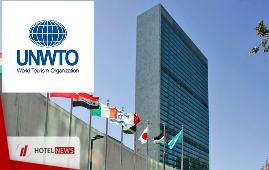
Tourism’s unique potential as a tool for driving the global sustainable development agenda has taken center stage at a special event hosted by the World Tourism Organization (UNWTO) in Geneva, Switzerland. The session, entitled “Tourism Financing for the 2030 Agenda” was held during the 2019 Global Review of Aid for Trade at the headquarters of the World Trade Organization (WTO). UNWTO Secretary-General Zurab Pololikashvili began the discussions by highlighting the key role that the global tourism sector plays in economic growth and job creation. Ministers, development partners and financing institutions need to better understand and recognize how tourism can contribute to the 2030 Sustainable Agenda. Tourism is explicitly mentioned as a target in three of the 17 Sustainable Development Goals (8, 12 and 14), though, as speakers at the Geneva session noted, for the sector to really realize its enormous potential, the amount of aid and development financing directed towards tourism needs to be increased significantly. Unlocking Tourism’s potential for realizing the 2030 Agenda requires a combination of effective and robust policy frameworks, enhanced private sector action, and an innovative approach to partnerships for development cooperation. “This is an important time for both the tourism and the international development sectors,” said Mr. Pololikashvili. “Strengthening and unlocking aid flows for tourism will help the sector be a driver of job creation, as well as of social and economic development and economic diversity. UNWTO welcomes the opportunity to join ministers, tourism leaders and our partners for these important talks here in Geneva. Working together we can harness the power of the new aid architecture and ensure that nobody gets left behind as tourism transforms lives around the world.” Also joining Mr Pololikashvili for the session were Ms. Arancha González, Executive Director, International Trade Centre (ITC), H.E Dr. Rania Al- Mashat, Minister of Tourism, The Arab Republic of Egypt, Mr. Toshiyuki Nakamura, Director General, Japan International Cooperation Agency (JICA), and Ms. Caroline Freund, Director of Trade, Regional Integration and Investment Climate, World Bank.
Create: Jul 15, 2019 Edit: Jul 17, 2019 International News
Career planning and development The lifelong process of working out a synthesis between individual interests and the opportunities (or limitations) present in the external work related environment, so that both individual and environmental objectives are fulfilled. It is a continual process that affects both the individual and the hospitality organization. For the individual in the hospitality industry it involves career planning and career outcomes and encompasses such issues as job change, mobility, and stages of a career. Whilst for the hospitality organization it is concerned with and influences human resource planning. The demise of the traditional hospitality organizational career, with its vertical progression, has affected an individual’s career development with the trend now being to develop core skills, increase marketability, and develop employability. A gradual shift has been seen from the traditional skill base (such as food and beverage) to more managerial and business skills together with the need for international experience and language skills.
Create: Jun 12, 2019 Edit: Jun 12, 2019 Hotel Management
The center of its activities in 1379 began managing Ali Farahbod on the computer.At first, the center of Dos and Windows operating systems was limited programming The growth of IT knowledge in Iran, we were forced to increase their activity so that we can maintain our place in the world of IT, Therefore, using our experience and knowledge engineers to recruit university graduates to expand the scope of its activities to the extent that today we our activities in various fields. Contact IranAAC IranAAC IranAAC AACIR.com Info@aacir.com 02188800121
Create: May 28, 2019 Edit: Jan 12, 2020 Regional Hotel Management Software
A cupcake is a small cake designed to serve one person, which may be baked in a small thin paper or aluminum cup. As with larger cakes, icing and other cake decorations such as fruit and candy may be applied. A standard cupcake uses the same basic ingredients as standard-sized cakes: butter, sugar, eggs, and flour. Nearly any recipe that is suitable for a layer cake can be used to bake cupcakes. The cake batter used for cupcakes may be flavored or have other ingredients stirred in, such as raisins, berries, nuts, or chocolate chips. Because their small size is more efficient for heat conduction, cupcakes bake much faster than a normal layered cake. During baking, the volume of the batter initially increases due to the production of carbon dioxide, then decreases upon cooling due to the release of leavening gases. Cupcakes may be topped with frosting or other cake decorations. They may be filled with frosting, fruit, or pastry cream. For bakers making a small number of filled cupcakes, this is usually accomplished by using a spoon or knife to scoop a small hole in the top of the cupcake. Another method is to just insert the pastry bag in the middle of the cupcake. In commercial bakeries, the filling may be injected using a syringe. Elaborately decorated cupcakes may be made for special occasions.
Create: May 18, 2019 Edit: May 28, 2019 Coffee Shop
Everyone recognizes a roasted coffee bean, but you might not recognize an actual coffee plant. White flowers on coffee tree Coffee trees are pruned short to conserve their energy and aid in harvesting, but can grow to more than 30 feet (9 meters) high. Each tree is covered with green, waxy leaves growing opposite each other in pairs. Coffee cherries grow along the branches. Because it grows in a continuous cycle, it’s not unusual to see flowers, green fruit and ripe fruit simultaneously on a single tree. It takes nearly a year for a cherry to mature after first flowering, and about 5 years of growth to reach full fruit production. While coffee plants can live up to 100 years, they are generally the most productive between the ages of 7 and 20. Proper care can maintain and even increase their output over the years, depending on the variety. The average coffee tree produces 10 pounds of coffee cherry per year, or 2 pounds of green beans.
Create: May 15, 2019 Edit: May 28, 2019 Coffee Shop
People who have these qualifications make good servers. To qualify for await staff position, you must be: Persuasive. You must have the ability to sell yourself, the restaurant, and menu items as you serve your guests. To do this, you must be able to communicate well. Your persuasive talent ensures that the guest’s wants and needs are met, and suggestive selling—that is, suggesting additional food items—adds to the pleasure of the meal, as well as increases the size of the check, the restaurant profits, and your tip.
Create: May 9, 2019 Edit: May 13, 2019 Waiter
People who have these qualifications make good servers. To qualify for await staff position, you must be: Knowledgeable. A good server must know the appropriate methods for serving tables and how to apply them in a seamless and efficient manner. You must have an extensive knowledge of the menu so that you can answer guests’ questions intelligently, suggest foods, and help increase sales. To complete the guest’s order and total the guest check, you must know basic math and have simple computer skills. Make note of local history, events, and cuisine trends so you can make conversation with guests.
Create: May 9, 2019 Edit: May 13, 2019 Waiter
IHG buys luxury hotel operator Six Senses Hotels Resorts & Spas from Pegasus Capital Advisors for $300 million. Revealing a move which increases IHG’s global presence and adds a hefty number of luxurious properties in some of the world’s most desirable and exotic destinations, the purchase of Six Senses by the hospitality goliath has been announced. Huge acquisitions are always a hot topic in the hospitality industry, and the latest news that industry giant InterContinental Hotel Group has bought luxury hotel group Six Senses from Pegasus Capital Advisors certainly falls into that category. For the cool price of $300m, IHG now takes control of all of Six Senses’ 16 hotels, 18 management contracts in the pipeline and more than 50 deals currently in negotiation. The move reflects IHG’s ambition to expand further into the luxury market, and Six Senses’ portfolio of idyllic properties in the Maldives, Thailand, Oman and Portugal, to name but a few, fully cements this intention. Six Senses will sit above IHG’s other luxury acquisitions of late, including Regent Hotels and Kimpton Hotels. Keith Barr, Chief Executive Officer of IHG, said, “Six Senses is an outstanding brand in the top-tier of luxury and one we’ve admired for some time. You only have to look at its iconic hotels and resorts to see how this acquisition will further round out our luxury offer. With a focus on wellness and sustainability, Six Senses has been voted the world’s top hotel brand for the past two years, which is a testament to its impressive management team who bring deep experience to IHG’s luxury operations.” The acquisition was conducted for $300m in cash and involves the sale of the Six Senses brand and its management business. While Six Senses has been operating as an asset-light business, IHG intends to grow Six Senses substantially over the next 10 years to reach a total of approximately 60 properties. The purchase does not include any real estate assets, but focuses on incorporating Six Senses spas, which total 37 under the Six Senses and LivNordic brands. The process of acquisition is a complex one, further complicated by the spa element, so no doubt both IHG and Six Senses were grateful that consultancy firm Horwath HTL Health and Wellness were on hand to advise. The company’s experience in wellness undoubtedly proved invaluable, and Ingo Schweder, Managing Director of Horwath HTL Health and Wellness, spoke of the trajectory of the wellness industry, saying, “With IHG’s acquisition of Six Senses, we see yet another major hospitality group making a large, strategic investment in wellness, signalling that wellness is not a fad but, in fact, the new reality and a necessary component of the hospitality business. People are becoming increasingly concerned about their health and wellbeing and investing in themselves to ensure an optimal status of health whether at home or while traveling.”
Create: Apr 9, 2019 Edit: Apr 10, 2019 International News
Create: Mar 10, 2019 Edit: Mar 17, 2019 TV

Create: Mar 10, 2019 Edit: Mar 17, 2019 TV

Hotel News - Red Planet Japan announces the $59.5 million acquisition of the Thailand-based hotel arm of its parent company Red Planet Hotels Limited on the back of a series of expansion announcements in the Asia Pacific region. Red Planet Japan has announced that it is acquiring the Thailand-based hotel arm of its parent company Red Planet Hotels Limited. Industry experts say the acquisition is likely to be completed by the end of the first quarter of the financial year 2019. Red Planet Japan will acquire a half dozen hotel-owning companies in Thailand, all of them from its parent company. This will make for a total acquisition consideration of 6.5 billion Japanese yen or $59.5 million. The acquisition includes five operating hotels, located in Surawong (Bangkok), Patong (Phuket), Asoke (Bangkok), Pattaya, and Hat Yai. It also includes a sixth property that is currently under development in Sukhumvit Soi 8 (Bangkok). The operating hotels being acquired in Thailand have a recorded sales that totals 692 million Japanese yen ($6 million) in 2017 and 787 million Japanese yen ($7.1 million) in 2018. As a result of this acquisition, Red Planet Japan’s portfolio will increase to a total of 15 hotels in Japan, Thailand, and the Philippines, including five hotels under development. EXPANSION OF JAPANESE TOURISM Japan, like many markets with easy access to Southeast Asia, has undergone a tourism boom in recent years. Factors such as the expansion of low-cost carrier routes, the loosening of visa requirements, and a growing affinity for Japanese culture, has fueled a substantial increase in the number of tourists travelling from Southeast Asia to Japan in recent years, especially from Thailand.
Create: Feb 25, 2019 Edit: Feb 26, 2019 International News
Regional project in Honduras, Integrated Central American Quality and Sustainability System, offers audits and advice to tourism companies requiring quality management. Companies passing the audit get a Quality Certification, signifying value and esteem in tourism market. These quality criteria encompass a range of requirements related to sustainability in order to enable tourism to act as a tool for sustainable development. SICCS benefits tourism companies with a long-term vision of sustainability as a criterion for action, promotes the voluntary commitment to sustainable devleopment criteria aqnd helps to maintain these standards through rigorous audits. The implementation of the project has increased the awareness of entrepreneurs of economic, environmental and social sustainability practices. Furthermore, it has improved their competitiveness. .
Create: Feb 19, 2019 Edit: Feb 20, 2019 International News
